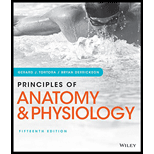
Principles of Anatomy and Physiology
15th Edition
ISBN: 9781119329398
Author: Gerard J Tortora, Bryan Derrickson
Publisher: John Wiley & Sons Inc
expand_more
expand_more
format_list_bulleted
Textbook Question
Chapter 20, Problem 3CTQ
Mr. Perkins is a large, 62-year-old man with a weakness for sweets and fried foods. His idea of exercise is walking to the kitchen for more potato chips to eat while he is watching sports on television. Lately, he's been troubled by chest pains when he walks up stairs. His doctor told him to quit smoking and scheduled cardiac angiography for the next week. What is involved in performing this procedure? Why did the doctor order this test?
Expert Solution & Answer
Want to see the full answer?
Check out a sample textbook solution
Students have asked these similar questions
Briefly state the physical meaning of the electrocapillary equation (Lippman equation).
Explain in a small summary how:
What genetic information can be obtained from a Punnet square? What genetic information cannot be determined from a Punnet square?
Why might a Punnet Square be beneficial to understanding genetics/inheritance?
In a small summary write down:
Chapter 20 Solutions
Principles of Anatomy and Physiology
Ch. 20 - l. Define each of the following external features...Ch. 20 - 2. Describe the structure of the pericardium and...Ch. 20 - 3. What are the characteristic internal features...Ch. 20 - Prob. 4CPCh. 20 - 5. What is the relationship between wall thickness...Ch. 20 - Prob. 6CPCh. 20 - What causes the heart valves to open and to close?...Ch. 20 - In correct sequence, which heart chambers, heart...Ch. 20 - Prob. 9CPCh. 20 - Prob. 10CP
Ch. 20 - 11. In what ways are autorhythmic fibers similar...Ch. 20 - What happens during each of the three phases of an...Ch. 20 - 13. In what ways are ECGs helpful in diagnosing...Ch. 20 - How does each ECG wave, interval, and segment...Ch. 20 - 15. Why must left ventricular pressure be greater...Ch. 20 - Prob. 16CPCh. 20 - During which two periods of the cardiac cycle do...Ch. 20 - Prob. 18CPCh. 20 - Prob. 19CPCh. 20 - Prob. 20CPCh. 20 - Prob. 21CPCh. 20 - Define cardiac reserve. How does it change with...Ch. 20 - Prob. 23CPCh. 20 - 24. What are some of the cardiovascular benefits...Ch. 20 - Prob. 25CPCh. 20 - Prob. 26CPCh. 20 - Why is the cardiovascular system one of the first...Ch. 20 - From which tissue does the heart develop?Ch. 20 - Gerald recently visited the dentist. During the...Ch. 20 - 2. Unathletic Sylvia resolves to begin an exercise...Ch. 20 - 3. Mr. Perkins is a large, 62-year-old man with a...
Additional Science Textbook Solutions
Find more solutions based on key concepts
Why do scientists think that all forms of life on earth have a common origin?
Genetics: From Genes to Genomes
1. Rub your hands together vigorously. What happens? Discuss the energy transfers and transformations that take...
College Physics: A Strategic Approach (3rd Edition)
Practice Exercise 1
Which of the following factors determines the size of an atom? a. the volume of the nucleus...
Chemistry: The Central Science (14th Edition)
45. Calculate the mass of nitrogen dissolved at room temperature in an 80.0-L home aquarium. Assume a total pre...
Chemistry: Structure and Properties (2nd Edition)
Single penny tossed 20 times and counting heads and tails: Probability (prediction): _______/20 heads ________/...
Laboratory Manual For Human Anatomy & Physiology
Knowledge Booster
Learn more about
Need a deep-dive on the concept behind this application? Look no further. Learn more about this topic, biology and related others by exploring similar questions and additional content below.Similar questions
- Not part of a graded assignment, from a past midtermarrow_forwardNoggin mutation: The mouse, one of the phenotypic consequences of Noggin mutationis mispatterning of the spinal cord, in the posterior region of the mouse embryo, suchthat in the hindlimb region the more ventral fates are lost, and the dorsal Pax3 domain isexpanded. (this experiment is not in the lectures).a. Hypothesis for why: What would be your hypothesis for why the ventral fatesare lost and dorsal fates expanded? Include in your answer the words notochord,BMP, SHH and either (or both of) surface ectoderm or lateral plate mesodermarrow_forwardNot part of a graded assignment, from a past midtermarrow_forward
- Explain in a flowcharts organazing the words down below: genetics Chromosomes Inheritance DNA & Genes Mutations Proteinsarrow_forwardplease helparrow_forwardWhat does the heavy dark line along collecting duct tell us about water reabsorption in this individual at this time? What does the heavy dark line along collecting duct tell us about ADH secretion in this individual at this time?arrow_forward
arrow_back_ios
SEE MORE QUESTIONS
arrow_forward_ios
Recommended textbooks for you
- Surgical Tech For Surgical Tech Pos CareHealth & NutritionISBN:9781337648868Author:AssociationPublisher:Cengage




Surgical Tech For Surgical Tech Pos Care
Health & Nutrition
ISBN:9781337648868
Author:Association
Publisher:Cengage


Complications during Labour and Delivery; Author: FirstCry Parenting;https://www.youtube.com/watch?v=QnCviG4GpYg;License: Standard YouTube License, CC-BY